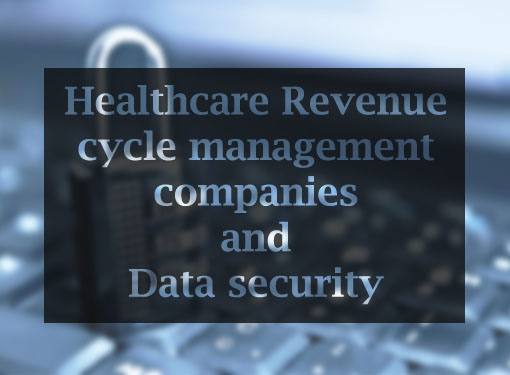One of the key areas that healthcare revenue cycle management companies need to focus is information security. Due to the sensitive nature of information that the RCM companies deal with, it is mandatory to maintain a secure work environment; but the ‘road to perfect security’ does not end just with that! Whenever technology blossoms with new innovations facilitating businesses and common people around the globe, the flip side is the possible exploitation of that technology for illegal activities. The U.S. healthcare industry is under constant threat of this unwritten ‘law of technology’!
In U.S., we keep hearing about patient data (PHI – Patient Health Information) leaks and loss due to data piracy attempts, ignorance and carelessness leading to compromise of patient information security and loss amounting to billions of dollars. Many revenue cycle management companies have now started to take-up certifications that can give them the processes that would significantly reduce such incidents and also to take immediate corrective measures should such an event occur.
Can certifications help in bridging the gap in data security?
This has been a question for ever, for almost every business; let alone the revenue cycle management companies. Getting a certification is not everything, but eases the concerns of data security. Adhering to policies and certifications are like traveling on a bridge that has already been laid for you; easier than building your own. Experts have already thought well and put forth as policies; but, once you are certified, you are not done with it; you need to keep following the policies, to reach the destination.
Let’s talk about policies that help in enhancing the healthcare security:
HIPAA:
The Health Insurance Portability and Accountability Act (HIPAA) was enacted by the U.S. government in 1996 with the view to establish “national framework for security standards and protection of confidentiality with regard to health care data and information”.
Moreover, it states that HIPAA assists in three prime segments: ‘Administrative Simplification’, ‘Security’ and ‘Privacy’ for PHI. Being in the industry, the healthcare revenue cycle management companies need to follow the nationalized policies in order to keep pace with industry standards and achieve enhanced operational efficiency. If it is an offshore medical billing company, it becomes essential for you to follow the guidelines of HIPAA to ensure safety of patient information and satisfy the security demands of your U.S. billing partner.
ISO 27001:
The ISO 27001 helps in attaining best-in-class Information Security Management System (ISMS). It insists on management standards for information security and is risk-based, helping in effective decision making. ISO 27001 allows you to set your goals for information security management specific to your business and in assessing your growth periodically and attaining augmented and measurable business results. ISO 27001 has many policies in common with HIPAA and covers the most sensitive areas of concern.
Following these policies can satisfy the security needs of your revenue cycle management company, and it is important to focus on continuous improvement after getting certified. You can refer to the related article on our Blog – ‘Securing patient data‘.

